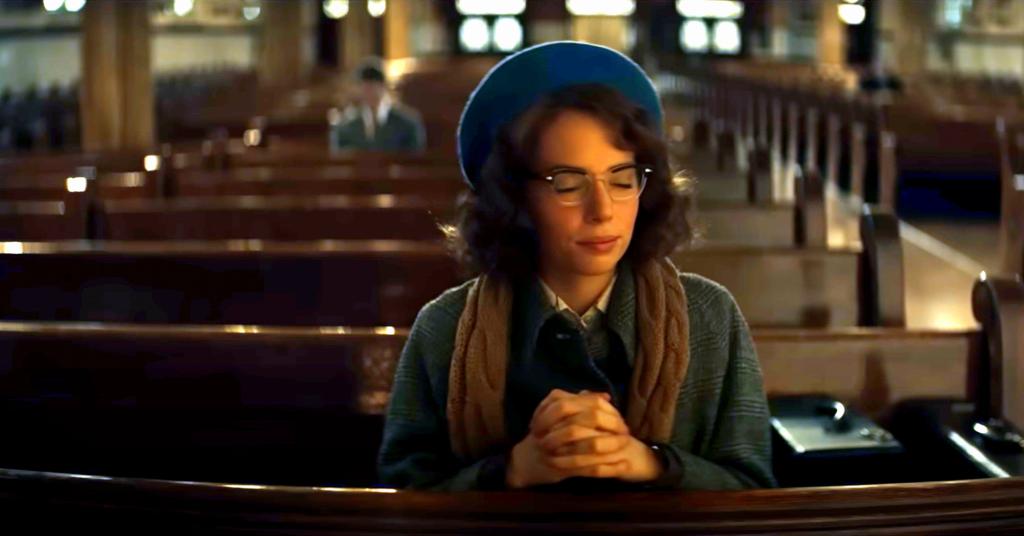As Southern Gothic and Catholic writer Flannery O’Connor, subject of the new film Wildcat, famously said (and does again, in the film):
The truth does not change according to our ability to stomach it.
O’Connor — whose work is about as cuddly as a prickly-pear cactus — looked at the world as it is, not as we’d like it to be. I’ve always thought of that as a hallmark of whatever can be defined as Catholic storytelling.
To me, the Catholic writer casts an unflinching eye on the absurdities, inequities and downright horrors of a fallen world but can still see grace in it.
For all its profanity and rough edges, I consider Father Stu to be a truly Catholic film, as was the often brutally violent The Passion of the Christ, and the powerful and shocking Calvary. These are far from the sort of faith-based films that are described in advertisements as inspirational, uplifting or heartwarming.
The films above may, at moments, inspire or uplift, or even warm the heart, but only after delivering several swift kicks to the head.
Wildcat is like that — and that’s true to the woman who inspired it.
The film is in limited release. Click here for screenings around the country.
The Paradox of Flannery O’Connor
Many writers of Wildcat reviews I’ve read are fans of O’Connor’s writing, and each critic’s personal history with her darkly funny, provocative and unsettling stories works its way into the view of the film.
I’m not one of those people.
I’ve watched documentaries about O’Connor, and read about her and her stories, but I can’t say as I’ve actually read all of even one of her tales. So I came to the film with some knowledge but without any sort of inherent attachment, positive or negative.
But, I know what it’s like to feel out of place, to realize that what you say or write doesn’t always land well on the audience. And, from time to time, I’ve experienced how physical limitations can shrink the world down to the size of your imagination.
In her life, cut short by lupus at 39, O’Connor didn’t travel far. Aside from forays to the Iowa Writers’ Workshop and New York City, the bulk of her time on Earth was spent at her childhood home in Georgia.
And, much of O’Connor’s last 14 years centered on a single room where she wrote the rest of her life away.
In a way, O’Connor’s biography reminds me of Jane Austen, another short-lived young woman whose environment was constricted, but whose understanding of human nature — and its abundant absurdities — had unfathomable depths.
Mixing Fiction with Fact in Wildcat
I watched Wildcat at a Los Angeles screening sponsored by Film Independent. Near as I could tell, the audience was there much more out of interest in indie film, and to hear the filmmaker Q&A afterward, than they were in Catholicism or even O’Connor herself (one girl I stood in line with knew nothing about O’Connor).
Directed and co-written (with Shelby Gaines) by Ethan Hawke, and starring his daughter — and longtime O’Connor fan — Maya Hawke (Stranger Things), the film intercuts scenes of O’Connor’s life with dramatizations of her short stories.
Hawke and Laura Linney, who plays O’Connor’s loving but uncomprehending mother Regina, also play several parts in the dramatizations.
The title of Wildcat comes from one of the short stories written as part of O’Connor’s master’s-thesis anthology in 1947, first published posthumously in 1970. Curiously, it’s not one of the stories dramatized in the film.
Even to someone who’s not an O’Connor devotee, the dramatizations capture the spirit of the author’s stories. Here’s how an essay at The Catholic Thinker describes O’Connor’s writing:
The work of Flannery O’Connor could be harsh, violent and discomfiting. And yet it is also thick with truth, grace and redemption. To the superficial reader, a yarn filled with unattractive figures on ill-fated endeavors may be all that is perceived. But to those willing to consider her work more deeply, powerful themes of deeply religious truths become apparent. Perhaps the greatest and most pervasive of these truths in Flannery’s stories is the pain, suffering and “meanness” that often accompanies the beautiful grace of God.
The mixture of fact and fiction (and some fictionalization of factual events) is an effective way to capture O’Connor’s contradictions, how the suffocating reality outside her mind contrasts with the lush, untamed garden within it.
Inside the Mind of a Writer
The idea of what inspires a writer has been dramatized before, with more comic effect, in Shakespeare in Love, and the Charles Dickens biopic The Man Who Invented Christmas. But while Wildcat has flashes of humor, it also stays true to O’Connor’s sharp-elbowed, unsentimental nature.
It’s also deeply moving, beautifully acted, and, for all its subject’s thorns, infused with hope. And, fittingly, it’s a testament to faith, of which O’Connor famously said (and also says in the film, as the script makes sure to include her greatest hits):
What people don’t realize is how much religion costs. They think faith is a big electric blanket, when, of course, it is the Cross.
I’ll leave it up to O’Connor fans to say whether or not the film was satisfying to them, but I enjoyed it — and the secular theater audience around me broke out in applause at the end.
Take a look:
The Catholic Stuff in Wildcat
Neither Hawke is Catholic, but that doesn’t diminish the depiction of O’Connor’s faith. It is as central to the film as it was to her life.
Interestingly, one of the best scenes has her talking to a priest, played by baptized Catholic Liam Neeson. He broke with the Faith in a public way by coming out in support of abortion in his native Ireland.
But, he took the job, didn’t he?
And Neeson also recently worked for the Catholic app Hallow, reading the works of C.S. Lewis.
To which I say, hmmm …
Anyway, the Hawkes made great use of O’Connor’s own prayer journal to track her inner life. As Ethan Hawke said at the Q&A:
Our relationship to faith and cinema is scary. And I think we’re conditioned to seeing movies where it’s either priests are the bad guys, they’re some kind of dark villain, or we’re being proselytized to, and we’re feeling like we’re supposed to make a donation at the end of the thing, or God won’t like us.
And that, over the years, has created a natural suspicion with an audience. And I also think that literature is right for talking about the inner life. It’s very difficult. I learned in making this movie, to talk about a young woman’s relationship to the divine on film, that’s very hard.
I don’t think we could have done it without the prayer journal. That was our key.
Would Flannery O’Connor Have Liked Wildcat?
Of course, we’ll never know — but we can imagine that it wouldn’t be a lukewarm reaction.
One of the stories dramatized in Wildcat, called The Life You Save May Be Your Own, was previously dramatized for TV in 1957, starring Gene Kelly as a shifty character with one arm.
A Facebook post from a Kelly fan page includes a quote from an O’Connor documentary, in which she says about the casting:
I have just learned via one of those gossip columns that this story I sold for a TV play is going to be put on in the spring and that a tap dancer by the name of Gene Kelly is going to make his television debut in it. The punishment always fits the crime.
Ethan Hawke has his own version of the reaction, as related during the Q&A:
[O’Connor] was in a situation very much like the one I’m in right now, doing a Q&A. And somebody raised their hand said, “What was it like to see Gene Kelly act in one of your stories?” And she said, “I can imagine a world in which it could have been worse.”
When I heard that, I thought every day while we were writing it and shooting it, editing it, I could hear her going, “Well, I can imagine a world where it could have been worse,” and I would just be haunted by that.
Judge for yourself:
As mentioned above, Wildcat went into limited release on May 3, with a wider release to follow.
Image: Maya Hawke as Flannery O’Connor in ‘Wildcat’/Oscilloscope Laboratories
Don’t miss a thing: Subscribe to all that I write at Authory.com/KateOHare.














